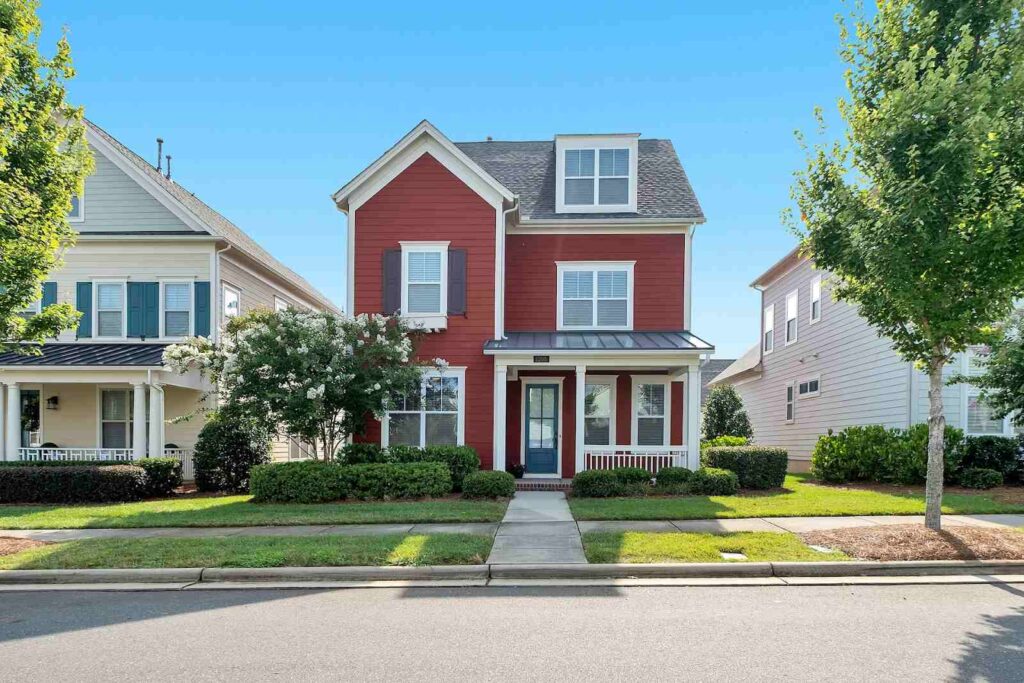When it comes to the cost of living in Nashville, there are many facets to consider. Nashville is world-famous for its vibrant music scene, southern hospitality, and steadily growing economy. Its allure is undeniable. But, if you are living in the city it is important to understand how the living costs are changing, and the impacts this can have on homeowners.
Many homeowners are drawn by the allure of Music City and they end up investing or buying a home without comprehensively understanding if the city is affordable for them. Like any other desirable city in the US, Nashville has seen the cost of living steadily increase in the last several years.
Forbes’ cost of living calculator estimates that housing in Nashville has increased by about 8% from 2022 while transportation and healthcare have both risen on average by about 11% and 5% respectively. Such information is important for people looking to settle in the city, but unfortunately, most are not informed about such statistics. These economic shifts have contributed to the increasing foreclosure rates witnessed in the country. Let’s look at key factors like housing, public transportation, and healthcare in Nashville and try to break them down.
Cost of Housing in Nashville
The cost of living in Nashville, specifically in relation to housing, has been a focal point of conversation due to the city’s rapid growth. Nashville’s cost of housing is on a steady incline as more and more people are “drawn to the rhythm of Music City.” A combination of factors, such as its booming job market and a rich culture, have made it an increasingly attractive place to live, thus impacting housing costs.
One primary consideration when discussing homeownership in Nashville, TN is mortgage interest prices. The city is currently facing the highest mortgage interest rates since 2008 which has placed an increased financial strain on many local homeowners.
Beyond the cost of owning a home, there are other expenses to consider. Utility prices, for example, are another integral part of the living index, is also bumping up as a result of inflation. While water, electricity, and gas prices can fluctuate based on usage and season, they are not significantly higher than the national average.
Food and Grocery Costs in Nashville
Grocery costs in Nashville are influenced by multiple factors, including the type of stores you choose to shop at. For example, shopping at discount retailers such as United Grocery Outlet can provide excellent value for your dollar. On the other hand, choosing to frequent more upscale grocery stores located in the city center will increase your average grocery bill. While Nashville, TN food prices may vary, they are generally on par with or slightly above the national average.
Aside from grocery costs, dining out is also a popular choice for many Nashville residents. The city boasts a diverse food scene, from budget-friendly eateries to high-end dining experiences. However, frequent dining out can add a significant amount to your living expenses, so it’s essential to budget for this if it’s part of your lifestyle.
Transportation Costs in Nashville
As one of the fastest-growing cities in the United States, Nashville offers diverse transportation options to its residents. The city runs on a comprehensive network of roads and highways, with many residents choosing to commute by car. On average, the cost of owning and maintaining a car in Nashville, which includes everything from insurance to repairs, is slightly higher than the national average. Gas prices in Tennessee tend to be slightly lower, helping to offset some of the overall transportation costs.
For those living closer to the heart of Nashville, public transportation options are available and can offer a cost-effective alternative to owning a car. The city’s bus system covers a wide range of areas, and while it may increase your commute time compared to driving, the cost savings can be significant.
There are also other transportation options to consider, such as bike and scooter rentals, particularly within the city center. These options can be cost-effective, especially for short distances. Some residents even choose to walk or bike to work, further reducing their transportation costs.
Healthcare Costs in Nashville
Healthcare is a crucial part of the cost of living, and understanding the costs associated with it in Nashville is essential when living in this vibrant city. According to data published by the Tennessee Department of Health, healthcare costs in Nashville can vary greatly depending on several factors such as your overall health, the type of care required, and insurance coverage.
In general, healthcare costs in Nashville are slightly above the national average. This reflects the presence of numerous high-quality healthcare facilities in the city, including the Vanderbilt University Medical Center, which is nationally ranked for its adult and pediatric specialties according to U.S. News and World Report.
The cost of health insurance is another significant aspect of healthcare spending. Tennessee has an open marketplace for health insurance, allowing residents to choose from a variety of coverage options. Depending on the plan, monthly premiums can range significantly, and it’s crucial to factor these costs into your monthly budget.
Prescription medication is another aspect of healthcare costs. Prices can fluctuate based on the type of medication and whether it’s a brand-name or generic drug. Tennessee offers prescription drug assistance programs to eligible residents, which can help offset some of these costs.
Education Costs in Nashville
Education is a fundamental part of life, and in Nashville, a variety of educational options exist that can significantly impact the cost of living. The city is served by the Metropolitan Nashville Public Schools district, which according to the National Center for Education Statistics, is one of the largest school districts in Tennessee. Public school education, which runs from kindergarten to grade 12, is funded by taxpayers and is free for residents.
However, parents also have the option to enroll their children in private schools. The cost of private school education in Nashville can vary widely based on the reputation of the school, the curriculum offered, and other unique features or services. According to Private School Review, the average annual private school tuition in Nashville is above the national average, making it a significant consideration for families.
Higher learning institutions in the city include Tennessee State University and Nashville State Community College. The tuition at these public institutions is generally lower than at private universities but can still represent a significant expenditure for students and families.
Taxes in Nashville
One significant advantage of living in Tennessee is the absence of a state income tax. This can potentially result in considerable savings, especially for higher-income residents. However, residents are subject to a Hall Income tax, which applies to certain interest and dividend income.
Property taxes are also a consideration for homeowners. Nashville property taxes are calculated based on the assessed value of the property, which is set at 25% of the appraised value for residential properties. According to the Nashville Government website, the city’s property tax rate is competitive compared to other major cities across the country.
Sales tax is another significant part of the tax structure in Nashville. The combined sales tax rate in Nashville, which includes the Tennessee state sales tax and the Metropolitan Government of Nashville and Davidson County local sales taxes, is higher than the national average. This sales tax applies to most goods and services, which can increase the cost of living.
Entertainment and Recreation Costs in Nashville
Nashville, also known as Music City, is a hub for entertainment and recreation, but these fun and exciting activities can add to the overall cost of living in the city. From music festivals and concerts to outdoor adventures and professional sports, there are plenty of options to explore, each with its own expenses.
Music is central to Nashville’s identity. The city offers a range of musical experiences, from big-ticket concerts at the Grand Ole Opry to smaller performances in local bars and clubs. Ticket prices can vary greatly depending on the venue and the act. According to data from Statista, the average cost of concert tickets has been rising steadily over the years.
For sports enthusiasts, the city has several professional sports teams, including the Nashville Predators (NHL), the Tennessee Titans (NFL), and Nashville SC (MLS). Attending a game can be a thrilling experience, but ticket prices can add up, especially if you’re a frequent spectator.
The city also boasts an impressive array of museums and cultural attractions, including the Country Music Hall of Fame and the Frist Art Museum. While these venues often charge admission fees, many also offer discounts for seniors, children, and students, or free admission on certain days.
Nashville’s beautiful parks and green spaces, including the famous Centennial Park, offer free or low-cost recreational opportunities. Hiking, biking, or simply enjoying a picnic in one of these spaces can be a cost-effective way to enjoy the city.
To Summarize:
The cost of living in Nashville can vary greatly depending on lifestyle choices and personal needs. As one of the fastest-growing cities in the United States, Music City offers a dynamic and vibrant lifestyle, but it’s essential to understand the associated costs to fully enjoy everything it has to offer.
Understanding the cost of living in Nashville, from rent prices to healthcare costs, can help build a more comprehensive picture of Nashville’s economy and how it relates to you as a homeowner. By understanding the cost of living in the city, homeowners can ensure their property does not turn into a burden and risk foreclosure.
With that said, many residents are feeling the financial clinch of inflation and rising mortgage interest rates. If you’re concerned about the impacts Nashville’s living costs may have on your ability to make monthly mortgage payments – or if you’re already behind – My Tennessee Home Solution is here to help.
Are You Facing the Risk of Foreclosure? My Tennessee Home Solution Can Help
My Tennessee Home Solution is a team of local, hard-working, and driven professionals with one goal – to make a difference in the residential real estate market. As a veteran-owned business, our values of loyalty, trustworthiness, and responsibility to every transaction ensure an experience that’s as smooth and straightforward as possible.
We specialize in the off-market acquisition of single-family homes, working creatively and enthusiastically to empower homeowners in challenging situations. Whether you’re facing foreclosure, dealing with a burdensome property, or simply need to sell quickly, we are here to provide you with an easy, transparent, and professional solution.
When you partner with My Tennessee Home Solution, you’re not only getting a reliable partner for your property needs but also supporting a business run by veterans who are driven to help others. We believe in the power of community, and through the property market, aim to foster a culture of empowerment, transparency, and mutual respect.
Our Equity Protection Program Protects Your Home From Foreclosure
Facing foreclosure? Worried about selling your home with little equity? We are here for you! Our Equity Protection Program serves Tennessee homeowners dealing with these exact challenges. Our expert team works alongside you, aiming for the best possible outcome tailored to your circumstances.
Whether you’re struggling with payments, have little equity, or need a quick sale, we’re ready to assist. Kindly get in touch with us today! Discover how our Equity Protection Program can ease your home-selling process.
10 Frequently Asked Questions about the Cost of Living in Nashville, TN
What is the average cost of living in Nashville, Tennessee?
The average cost of living in Nashville, TN, can vary depending on numerous factors including housing, groceries, healthcare, and transportation. While some expenses may be lower than the national average, others, like housing, are typically higher. Considering all factors, the cost of living in Nashville is generally higher than the state average but lower than in many other major U.S. cities.
How do housing costs in Nashville compare to the national average?
Housing costs in Nashville are generally higher than the national average. This includes both home prices and rent prices. The rise in housing costs is largely due to the city’s growth and popularity. However, housing options do exist to fit various budgets, and prices can vary depending on the location and size of the property.
What is the average rent price for a two-bedroom apartment in Nashville?
The average rent price for a two-bedroom apartment in Nashville can vary significantly based on location and amenities. Generally speaking, rent prices are typically higher than the state average, reflecting the city’s desirability and growth.
How does the cost of healthcare in Nashville compare to other cities in the U.S.?
Healthcare costs in Nashville are slightly above the national average. The cost can vary depending on the services required and your insurance coverage. Despite the higher costs, Nashville offers a high standard of healthcare with a number of reputed healthcare facilities.
What is the average cost of utilities in Nashville?
The average cost of utilities in Nashville, which includes electricity, water, and garbage services, is relatively comparable to the national average. However, this can fluctuate based on usage and the time of year. It’s essential to factor these costs into your monthly budget.
How much does a meal cost in a restaurant in Nashville?
The price of a meal in Nashville can vary greatly depending on the type of restaurant. In general, the cost of dining out in the city is on par with, or slightly higher than, the national average. Nashville’s thriving food scene offers a wide range of dining options to fit various budgets.
What is the cost of public transportation in Nashville?
Public transportation in Nashville is relatively affordable compared to other major cities. The city’s public transit agency offers several fare options, and monthly passes can be a cost-effective choice for regular commuters. However, many residents of Nashville also rely on cars for transportation, which can add to overall living expenses.
How do property taxes in Nashville compare to other major U.S. cities?
Property taxes in Nashville are generally lower than in many major U.S. cities. The exact amount homeowners pay will depend on the appraised value of their property. Despite this, the overall cost of homeownership can be higher due to the above-average home prices in the city.
What is the average cost of education in Nashville?
Education costs in Nashville can vary depending on the type of schooling. Public schooling is funded by taxes and is free for residents, while private schools and higher education institutions have varying costs. Compared to the national average, the cost of education in the city can be higher, especially for private or specialized education services.
What are some of the common entertainment and recreation expenses in Nashville?
Entertainment and recreation expenses in Nashville can vary widely. Attending a concert at one of the city’s famous music venues, for example, can range in price depending on the act and location. Similarly, attending professional sports games, visiting museums, or dining out can add to your living expenses. While these activities can impact your budget, they contribute to the rich cultural life that makes living in Nashville unique.










